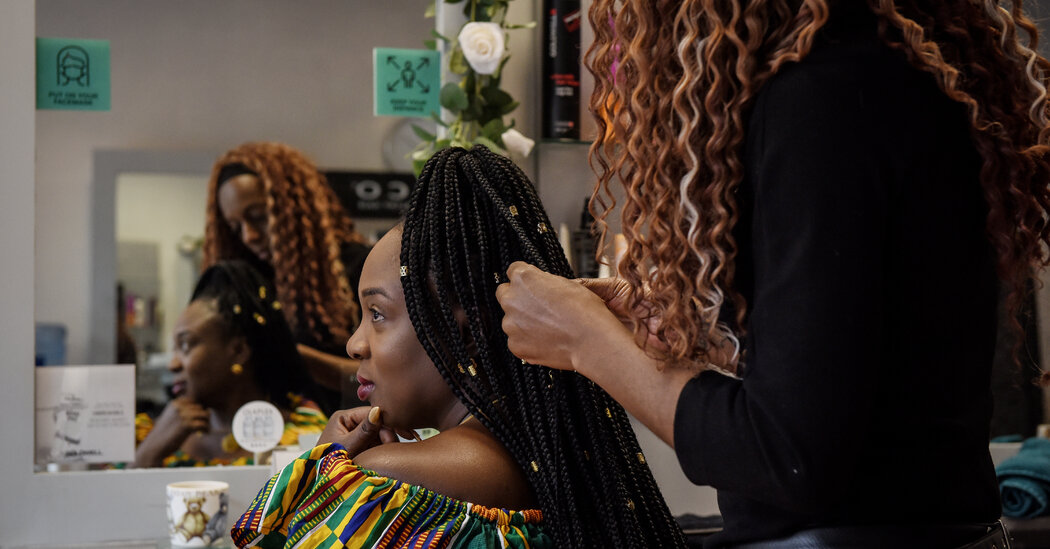
LEEDS, England — The purr of the gold clippers breaks the silence inside the Piranha Hair Studio as Qasim Sajjad teaches a lesson on how to cut Black hair. Brian Swarry, the studio’s owner, offers extra instruction via Facetime while a junior hairdresser watches and listens.
It is an unremarkable scene, except that the junior hairdresser is white.
For years, Mr. Swarry, 48, known as Barber B, has built a reputation in an industry tailored to white customers for teaching trainees of all races to cut Black hair. Most certified hairdressers in Britain never learn how, nor have they been required to do so.
“Ten years ago, there was nowhere we could go to learn to cut Black Afro hair,” Mr. Swarry said, referring to the way Black British people describe their coily or kinky-textured hair.
Now, the agencies that set standards for the profession in Britain are signaling change, even if it is too soon to know how big the shift will be or how quickly it will come. In May, after several years of lobbying by advocacy groups and a leading fashion magazine, the Hair and Beauty Industry Authority said it was updating its certification standards so that hairdressers can meet the “needs of the U.K.’s diverse community.”
The immediate question was whether every trainee, regardless of race, would now have to learn to cut Black hair. The answer is still murky, partly because the industry is sprawling and decentralized, with at least six licensing organizations that certify the thousands of stylists produced by training schools every year.
But inside the industry there is growing recognition that change is coming and is long overdue. One certification organization, Qualifi, has started requiring graduates to demonstrate competence in working with “textured” hair.
Mr. Swarry predicted that broadening training would be challenging.
“For this to work properly, white stylists are going to have to spend time in a Black salon where they’ve got a constant flow of Afro hair,” said Mr. Swarry, whose studio is one of the best-known Black barber shops in northern England, and who was on an advisory board that consulted on the new standard.
Few commercial settings are more personal and intimate than a hair salon. Even as many Black stylists see the changing standards as deeply significant, others worry that the change could present new competition for Black barber shops and salons, which have painstakingly carved out a niche over the years.
There is no question that Black communities are underserved in Britain. According to one survey, the country has just 314 Afro hairdressing salons out of almost 45,000 registered hair and beauty salons. In some cities, merely getting an appointment can take weeks. Other salons sometimes turn away Black customers, saying that their stylists are not trained to help them.
With Britain now grappling with how to confront racial inequality, the styling of Black hair has assumed growing political and cultural resonance, including books, documentaries and advocacy campaigns on the subject. The Halo Collective has raised awareness about how Black hair can lead to stigma and discrimination at school and in the work force. And in 2020, a teenager was awarded 8,500 pounds (about $11,800) in an out-of-court settlement after being repeatedly sent home from school because of her natural hair.
In Southeast London, Monique Tomlinson oversees Peckham Palms, an Afro hair and beauty hub. Many of the women who work there are self-taught and are now being encouraged to broaden their skills with formal training.
Brushing back the coils of her twist-out, Ms. Tomlinson said it had taken too long for broader society to recognize Afro hair as beautiful and worthy of care.
“I’m not going to just sit down and be thankful for the bread crumbs that you’ve given me,” said Ms. Tomlinson. She attributed changing attitudes around hair to the Black Lives Matter movement and the rising trendiness of Black culture in Britain.
Carmen Maingot, a Black entrepreneur, is believed to have opened Britain’s first hair-straightening salon in London’s North Kensington district in 1955, when Black women in Europe often straightened and styled their hair to meet European beauty standards.
Two years later, Winifred Atwell, a pianist from Trinidad who became the first Black recording artist to reach No. 1 in Britain’s singles chart, opened a salon in the Brixton area of South London after being given a botched hairstyle.
Zainab Swanzy, the author of the forthcoming book “A Quick Ting On: The Black Girl Afro,” said, “Afro hair has pretty much always been ignored in mainstream U.K. hairdressing.”
She said the Black immigrants who arrived in the country after World War II — known as the Windrush generation — “were advised to bring their own tools and products for their hair from the Caribbean, because once they arrived in the UK, not a single hairdresser would be able to help them.”
In the 1970s, professional Afro hairdressing was a lonely endeavor in Bradford, a city in northwestern England. Calma Ritchie, 55, now has a loyal clientele at her salon, XL Hair Design, but she began working out of her living room or kitchen.
She earned her certification early on, but was trained only on “European” hair. Formal instruction for styling Black hair did not exist, so Ms. Ritchie practiced on her siblings.
The first time she chemically straightened her brother’s hair, she left the product on too long and his hair fell out. “Just in patches,” she said, laughing.
She said that recognition of the importance of training for Black hair was overdue: “It’s about time,” she said.
For Nicola Oates, 39, a newly certified white hairdresser from Tamworth, a very different message was given during her training course last year. When she suggested that trainees should learn to work on Black hair, her instructor said she could bring in only clients with “normal” hair to practice on.
“We should be able to have anybody in our chair, and we should know, or be willing to help them find out, not ever, ever refuse them,” said Ms. Oates, who signed a petition last year that pushed for mandatory training in textured hair. To learn, she has turned to tutorials by Black hair experts on Instagram.
The dearth of trained hairdressers is also a problem for Black people working in fashion and the media. Emma Dabiri, a television presenter who is the author of the 2019 best seller “Don’t Touch My Hair,” said she often had to do her own hair before taping an appearance.
“When you see the pictures or the appearance, you can see that no one’s done my hair,” she said. “Having a familiarity with Afro-textured hair would be an improvement.”
Yet it remains an open question whether Black women will generally want to be attended to by stylists whose hair textures differ from their own.
“If you’ve grown up with a certain texture, you know how to manipulate it. You know how to style it,” Ms. Tomlinson said. “There’s a lot of work involved. It’s not as easy as just, ‘I’m going to learn Afro hair.’”
There is also concern that changing the training standards could take customers from existing Black-owned salons.
“The industry has been nurtured and incubated by Black women from the ground up,” said Margot Rodway-Brown, who owns Adornment365, one of several salons that provide specialized services for natural Afro hair in London’s Brixton neighborhood, home to one of Britain’s largest Black communities.
“L’Oréal didn’t come to us and say, ‘Now you can wear an Afro,’” she said. “Will genuine access be opened up to people in our community? If we’re now sharing the skill set and the insight that gives us a competitive advantage, what does that then do to our market share?”
For Marvina Newton, 36, the standardization of textured hair training could be positive if it empowers Black-owned salons. “I want to spend on Black businesses,” she said. “Let resources go into Black hairdressers who can train white hairdressers how to do our hair.”
The preservation of Black-owned hair salons is deeply personal to Ms. Newton, who shaved off her chemically straightened hair to encourage her daughter to be proud of her own natural hair.
Pointing to a nearby customer with a small blond Afro in Elite Studio in Armley, Ms. Newton said, “My daughter gets to see that. It gets her to think, ‘Oh, my hair is nice.’”
“This is what we get when we go to Black hairdressers,” she said. “We get to see ourselves.”




